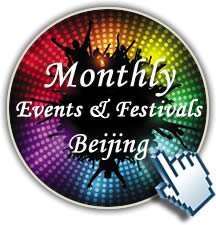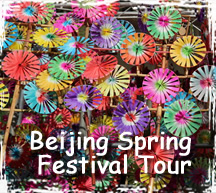Chinese Holidays & Festivals
Like other peoples in the world, Chinese people have two kinds of of holidays: official and traditional. As China is a huge country with 56 ethnic minority groups. So in addition, minority nationalities in China have their own unique holidays. Hong Kong, Taiwan and Macao also have their own official and traditional festivals. Official Chinese Holidays:
New Year's Day (January 1) New Year's ay is celebrated not as much as it is in other parts of the world because Chinese Lunar New Year is coming a month away. However, people do enjoy one day holiday. As a member of the global village, China is much westernized than ever before. More and more young people follow up the western countries for a big holiday, holding parties, having excursions. Chinese government makes it a 3 day holiday by moving the prior weekend and the upcoming one together. This is the Chinese government's "holiday economy" policy.
 Spring Festival (The Chinese Lunar New Year, later Jan or Early Feb )
Spring Festival (The Chinese Lunar New Year, later Jan or Early Feb )Spring Festival is the biggest and most celebrated festival in China as well some countries of east and south east Asia. For more information on Chinese Lunar New Year, please see the Special Page for China Lunar New Year. People enjoy 3 day holiday. Chinese government makes it a 7 day holiday by moving the prior weekend and the upcoming one together. This is the Chinese government's "holiday economy" policy.
International Women's Day ( March 8 )
In China, on March 08, most of the women employees will enjoy a whole or an half paid day-off on the day while the men still work, a kind of the celeberation for women's day.
Tree-Planting Day ( April 1)
On the April Fools'Day, here in China it falls on its tree plantation Day, highly promoted since the late 70's by the reformist government. It now has become a established day for tree planting. It reminds people of the importance of greening campaign all over the country during the month each year.
International Labor Day ( May 1) - A week long holiday
The second important holiday just after the New Year's Day. Employees will enjoy a one-day paid day-off. Celebration parties in parks took the place of parades today. Chinese government makes it a 3 day holiday by moving the prior weekend and the upcoming one together. This is the Chinese government's "holiday economy" policy.
Youth Day ( May 4 )
May 4th Youth Day is a day in memory of the first mass student movement in 1919. It is a movement triggered by the old Chinese government that gave in to the Japanese government's attempt to colonize Shandong Province. Beside, it is also an anti-Confucius movement as well as one that promoted the western scientific and democratic ideas. Now on that day, the government at all levels will organize youth activities everywhere in the country to commemorate the special day.
International Children's Day ( June 1)
It is a big day all the kids all over the country. Almost all entertainment places such as cinemas, parks and children museums and palaces are open free to them or with discounted prices. It is alos the right time for people to show their concern over the problems arising from the kids.
The CCP's Birthday ( July 1 )
It is the day in memory of the founding of the Chinese Communist Party in 1921 in Shanghai. The special day is often celeberated by party members who are holding meetings or reading front page editorials from major government newspapers.
Army's Day (August 1)
It is a day for People's Liberation Army to commemorate the communist-led army for the first armed uprising in Chinese communist history against the Nationalists on August 1, 1927. It was considered as the beginning and founding of the Red Army (later the People's Liberation Army). Now the anniversary is a celeberation day for Chinese servicemen, also a time to promote better relationships between the army and civilians.
Teacher's Day ( September 10)
September 10 is the Teacher's Day of People's Republic of China. In the year 1984, Wang Zishen, former president of Beijing Normal University, suggested to establish a festivial day for the Chinese teachers. On January 21, 1985, the ninth session of the Sixth NPC Standing Committee formally decided to fix the September 10 of every year as the Teacher's Day of the country.
National Day (October 1) A week long holiday
It is the most important day for marking the anniversary of the founding of the People's Republic of China in 1949. Employees will enjoy a 3-day paid day-off. Celebration parties in parks took the place of parades today. The official paid day off for the National Day is 3 days. But Chinese government makes it a 7 day holiday by moving the prior weekend and the upcoming one together with these 3 days. This is the Chinese government's "holiday economy" policy.
Chinese Traditional Holidays
The calendars that most the Chinese use are a unique lunar-solar system. When it comes to the Chinese Traditional Holidays, Chinese people use the lunar system to mark the traditional holidays. Lantern Festival ( 15th of the first month of the lunar year )
Lantern exhibits, lion and dragon dances, and eating Tang Yuan (ball-shaped boiled sweet rice dumplings with delicious stuffing.) feature this day. It is very much celebrated in the rural areas by farmers. The Lantern Festival also marks the end of the Chinese New Year season.
Qing Ming ( April 4th - 6th )
Also called Pure and Bright Festival, Pure and Clear Brightness Festival, Grave Sweeping Ceremony. This is a solar based festival which falls on April 4th, 5th, or 6th. The festival extends over a week, allowing families time to visit the graves of their ancestors.
Duan Wu (Dragon Boat) Festival (5th of the 5th month of the lunar year )
Also called the Dragon Boat Festival, a lunar holiday, occurring on the fifth day of the fifth lunar month. It is in memory of a great patriot poet named Qu Yuan of the then State of Chu during the Warring States period (475-221 B.C, who drowned himself to protest his emperor who gave in to the bully State of Chin. For fear that fish may eat his body, people of Chu launched their boats and started throwing rice dumplings wrapped in bamboo leaves into the river where he was drowned to feed the fish. Now in some places, the big event of dragon boat contest will be held to commorate the special day. People today still have the bamboo-leave rice dumplings on the occasion today.
The Seventh Eve - Chinese Valentine's Day (7th of the seventh month of the lunar year )
The Chinese also have a day devoted to love. Qi Qiao Jie, or the seventh eve, is often referred to as Chinese Valentine's Day. Young people exchange gifts each other, going to cinima, bars, parties and many more.
Mid-Autumn Festival (15th of the eighth month)
It is second important Chinese traditional festival, just after the Chinese New Year. The moon on this day is the fullest and largest to the eye. Viewing it by the whole family while feasting on good wine, fruits and moon-cakes features the night event.
Chinese Minority Nationalities' Holidays
There are 56 nationalities in China and each of them has their own unique festivals. Below are only some of the listed the major events in the minority group:The Jingbo Dancing Festival
The Bouyei Dancing Party
The Tujia, Hui, Dongxiang, Baoan Songfest
The Moslem Corban Festival
The Jing Singing Festival
The Lisu Scimitar Rung Festival
The Jingbo Dancing Festival
The Zhuang Song Festival
The Bai Third Moon Fair
The Dai (Tai) Water sprinkling Festival
The Tibetan New Year
The Mongolian Nadam Fair
The Yao Danu Festival
The Yi Torch Festival
The Miao New Year Festival
The Dong Fire-Works Festival
Beijing Spring Festival Tour
| » Chinese New Year Eve Experience Tour |
| » Beijing Spring Festival Day Tour |
| » Lantern Festival Experience Tour |
| » Beijing Spring Festival 6-Day Tour Package |
Questions & Answers:




